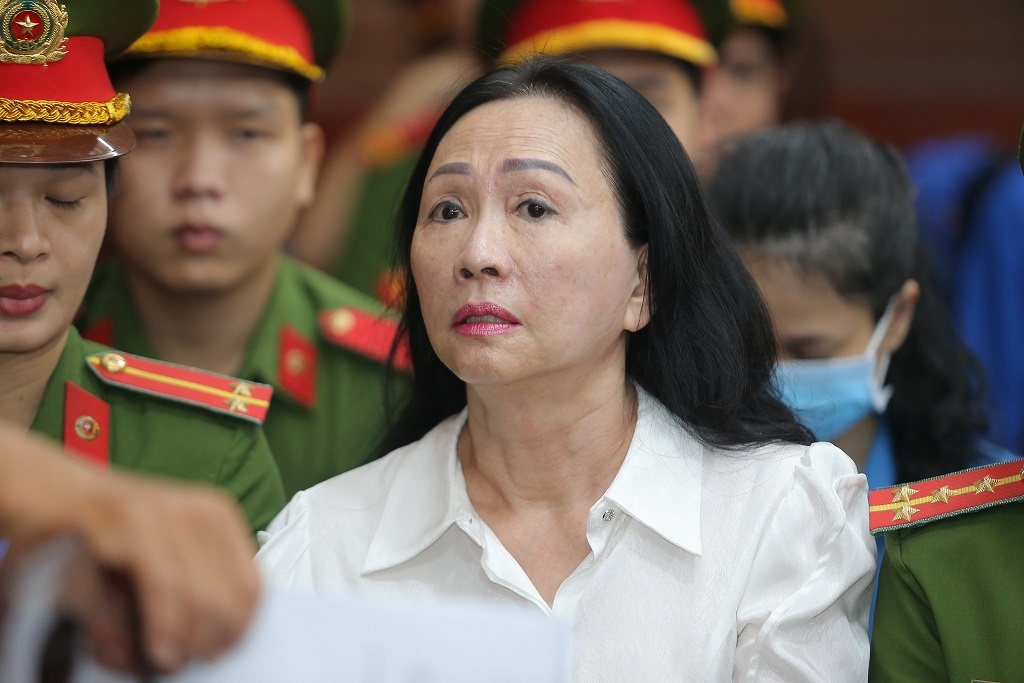SCB, Van Thinh Phat execs convicted of embezzlement; Truong My Lan sentenced to death
 |
| Truong My Lan at the courthouse on April 11. Photo: Baodautu.vn |
The court on April 11 concluded that Truong My Lan and 85 others involved in the case were culpable for the misappropriation of assets at SCB and Van Thinh Phat Group.
Particularly, Ho Chi Minh City People's Court sentenced Truong My Lan (68 years old, chairwoman of Van Thinh Phat Group) to 20 years in prison for the charge of bribery, 20 years for violating regulations on lending activities of credit institutions, and death for embezzlement.
During the trial, SCB executives admitted to their actions as described in the indictment.
The court established that Truong My Lan was the leader of Van Thinh Phat Group and exercised control over more than 91 per cent of SCB's shares, thus holding significant decision-making power within the bank. Additionally, Lan was directly involved in directing credit activities and appointing key personnel at SCB.
Despite arguments from the defence claiming Lan held no official position at SCB and therefore couldn't be culpable of embezzlement, the court dismissed this assertion. It also rejected the defence's claim that Lan had injected assets into SCB for restructuring purposes.
The court determined that Lan had only established legal entities to facilitate borrowing, and these loans were supported by fabricated collateral. Lan enlisted individuals such as Vo Tan Hoang Van and Tran Thi My Dung to withdraw funds from SCB for personal use.
Similarly, Do Thi Nhan, former director of the Inspectorate, Supervision Department of the State Bank of Vietnam (SBV), was found guilty of bribery during the investigation.
Despite her knowledge of irregularities at SCB, Nhan failed to report them and instead engaged in discussions with Lan about the bank's restructuring. Following these discussions, Nhan received $5.2 million from Lan through Vo Tan Hoang Van.
The court deemed Nhan's acceptance of the funds as bribery, especially considering her manipulation of inspection data to conceal SCB's irregularities.
The court concluded that the offences committed by Truong My Lan and others were highly serious and organised, with little possibility of recovering the large sums of money lost. The trial continues as the court deliberates on the culpability of other defendants involved in the case.
Losses
According to the court, to legitimise cash withdrawals and avoid detection of misconduct, Lan instructed SCB officials to transfer disbursed funds to "ghost" companies, inflate collateral assets, falsify records, and subsequently withdraw cash or carry out circular transfers to obscure the money trail.
Inflating the value of collateral assets to secure large loans was merely a ploy to siphon funds deposited by individuals at SCB.
From 2012 to 2017, Lan orchestrated the falsification of records for 304 clients, resulting in 368 loans. By 2022, these loans had accumulated a debt of over $5.28 billion in principal and interest.
After deducting from the collateral assets, these loans caused losses of around $2.59 billion. During this period, Lan's actions constituted violating regulations on lending in the operations of credit institutions.
From February 2018 to October 2022, Lan directed the falsification of 916 loan applications from SCB worth nearly $21.8 billion, embezzling nearly $12.16 billion and causing nearly $5.2 billion in interest losses.
Due to changes in the Criminal Code 2015 regarding the handling of violations before and after January 1, 2018, Lan's actions during this period constituted embezzlement.
"The indictment of the defendant's actions before January 1, 2018, for violating lending regulations in the operations of credit institutions is appropriate and beneficial to the defendant," the court stated.
Over 10 years of controlling SCB, Lan directed her accomplices to disburse over 2,500 loans to companies within the Van Thinh Phat ecosystem.
By October 2022, Lan and Van Thinh Phat still owed nearly 1,300 loans amounting to over $27 billion in principal and interest.
"The prosecutor's identification of damages including principal and interest up to the date of the indictment is appropriate," the court said, rejecting the lawyers' arguments for subtracting interest. "The prosecutor applied the principle of benefit, using evidence to eliminate some of the defendants' responsibilities, which benefited the defendants."
Inspector's defence rejected
To conceal SCB's weaknesses and help the bank escape special scrutiny, Lan instructed subordinates to bribe the inspection team.
Vo Tan Hoang Van, former CEO of SCB, gave $5.2 million to Nhan, four times to adjust inspection results in favour of SCB, enabling it to restructure.
During the inspection, Nhan was aware that Lan held a significant stake in SCB and was responsible for compiling inspection reports for submission to the SBV and the government.
However, Nhan met Lan through Vo Tan Hoang Van twice to discuss the situation at SCB. In the first meeting, Lan proposed that Nhan support SCB by ending the inspection early so that foreign investors could buy shares in SCB and continue the restructuring. In the second meeting, Nhan suggested that Lan sell assets to repay old loans to prevent the case from being investigated.
After two meetings, Nhan received $5.2 million from SCB through Van. In return, Nhan adjusted the inspection results to avoid special scrutiny and did not report any misconduct at SCB to investigative agencies.
Other members of the inspection team did not know that Nhan met with Van and Lan or the purpose of the adjusted data, narrowing the scope of the inspection.
The defendant's directives were essentially a method to negotiate bribes from Lan. Moreover, the money the defendant received coincided with the times she was reporting to inspection agencies about SCB.
The testimonies of employees at SCB Cau Giay determined that the amount transferred to this branch and then withdrawn to exchange for USD to give to Van coincided in terms of time and value.
"The entire sequence of actions of the defendant from beginning to end and other evidence is sufficient to determine that the defendant is fully aware of her actions," the verdict said.
According to the court, when Nhan, as head of the inspection team, she saw signs of misconduct, she should have reported to the investigative agency, but instead proposed that Nguyen Van Hung (chief inspector) handle the matter.
In court, the defendant stated that the reason for receiving the payment was "to protect her family because at that time many people related to the case had died ... She contacted me many times to return the money but could not." This defence was ruled as being unfounded.
“You didn't have to accept money four times if you didn't want to, or give the passcode to your house so Van could drop money off there,” the verdict said. "Therefore, the defendant's actions are sufficient to constitute the offence of giving bribes and also show Nhan accepted them, so the arguments from the defence are not accepted."
 | Truong My Lan family sells Hong Kong building for $820 million The family of Truong My Lan – the founder of Van Thinh Phat Group, has reportedly sold a prime Grade A office building in the heart of Hong Kong to an entity associated with Taiwanese technology magnate Steve Chang, founder and chairman of Tokyo-listed cybersecurity firm Trend Micro Inc. |
What the stars mean:
★ Poor ★ ★ Promising ★★★ Good ★★★★ Very good ★★★★★ Exceptional
Related Contents
Latest News
More News
- Tet 2026 points to more value-driven consumption (January 29, 2026 | 15:10)
- Nestlé Vietnam's Lunar New Year campaign reframes how Tet is counted (January 28, 2026 | 11:40)
- Tet event in Japan celebrates success of 14th National Party Congress (January 25, 2026 | 10:04)
- 14th National Party Congress wraps up with success (January 25, 2026 | 09:49)
- Congratulations from VFF Central Committee's int’l partners to 14th National Party Congress (January 25, 2026 | 09:46)
- List of newly-elected members of 14th Political Bureau announced (January 23, 2026 | 16:27)
- 14th Party Central Committee unanimously elects To Lam as General Secretary (January 23, 2026 | 16:22)
- List of members of 14th Party Central Committee announced (January 23, 2026 | 09:12)
- Highlights of fourth working day of 14th National Party Congress (January 23, 2026 | 09:06)
- Press provides timely, accurate coverage of 14th National Party Congress (January 22, 2026 | 09:49)

 Tag:
Tag:




















 Mobile Version
Mobile Version